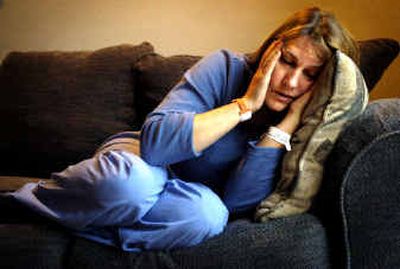Soccer mom jolted by lightning at park

Lightning struck a mother at a Spokane Valley soccer tournament Friday in Plantes Ferry Park, less than an hour after she questioned tournament officials about the safety of playing in an electrical storm.
Monica Phillipy was standing beneath some power lines when the strike occurred. The lines apparently took the brunt of the bolt, but a bright flash jumped from the wires, hitting the 45-year-old Mead woman in the head.
She survived the 10 a.m. strike and spent the next six hours at Spokane Valley Hospital, where she was later released.
To the mother’s dismay, the soccer teams continued playing through the storm after she was hit.
“I was just really irritated because they should not have been playing soccer with lightning around,” said Phillipy, who stands 5 feet 4 and weighs 140 pounds. “I love soccer, but safety comes first.”
Witnesses said lightning was striking a ridge top roughly two miles north of the park shortly before Phillipy was hit. Phillipy said she saw lightning strike near some railroad tracks roughly one mile south of the park, as well.
The soccer match Phillipy was watching stopped briefly, but officials decided to resume play. Phillipy’s son, Ryan, continued playing after his mother was taken to the hospital. It appeared she was going to be OK and grown-ups reasoned it would be less traumatic for the boy if he wasn’t in the thick of the emergency.
Friday was part of the three-day River City Soccer Cup, a youth event featuring 97 teams. The players range in age from middle school to high school. Though play was interrupted for about 10 minutes in the game Phillipy was watching, all other games in the park continued.
“I got a call from one of the marshals up there. She told me what happened, and I said, ‘Go ahead and stop the game,’ and they did for a while,” said Jeff Orwick, tournament director. “We’ve got a lot of experienced people and referees who are informed about lightning.”
Kelly Reynolds, a mother at the delayed game, said officials should have acted sooner. Local high school soccer programs, for example, call off play if lightning strikes within 20 miles of a match.
“There were two big (thunder) cracks right over the top of us,” said Reynolds, who was in the restroom when the storm hit. “It shook the outhouse.”
The strike singed Phillipy’s hair and left a burn mark on her head. Hours after the accident, she could not keep her right eye opened. The doctor who treated her at Valley Hospital said she was one of only three lightning patients he’d ever treated and the only one to go home the same day. One died. The other was hospitalized for some time. It will take weeks for the full ramifications of the strike to be realized.
Parent Kim Dunbar was thankful she wasn’t the victim.
“I was standing in front of her,” said Dunbar, of Spokane. “I saw from the corner of my eye that my hair was standing up. It hit her.”
Dunbar’s mother, Juanita Pool, said Phillipy approached her immediately after the strike, complaining of eye pain. Phillipy said she could still feel the electricity swirling around the side of her face. Seconds later, as Phillipy tried to walk onto the field and stop the game, she collapsed.
“She lost consciousness for about 30 seconds,” said Kevin Uphus, a Spokane Fire District captain. “But she was conscious and alert later.”
A handful of adults approached medics after the incident, inquiring about the safety of the situation. Uphus said it didn’t look safe to him. However, few of those people left the park after speaking with the captain.
According to the National Weather Service, roughly 80 people are killed and 300 are injured in the United States every year by lightning. The service recommends a “30/30 rule” for lightning safety.
“Go indoors if, after seeing lightning, you cannot count to 30 before hearing thunder,” the weather service advises. “Stay indoors for 30 minutes after hearing the last clap of thunder.”